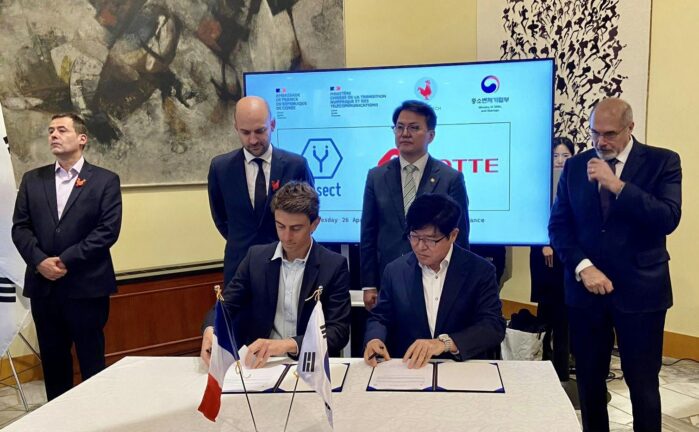French startup Ÿnsect has signed a memorandum of understanding (MOU) with Korean food company LOTTE to explore human food applications for edible insects.
LOTTE, which is also working with US-based ASPIRE on human food applications for crickets, will conduct joint research with Ÿnsect to develop food products featuring mealworms, explore potential health claims, and conduct consumer research in Europe and South Korea.
“Through LOTTE R&D center, we now benefit from the support of a key player to better understand the different markets in which we are establishing ourselves across the Asian continent and thus be able to meet the demand for local proteins,” said Ÿnsect food & plant sales director Guillaume Daoulas.
A focus on ‘high value markets to enable us to reach faster profitability’
Historically, Ÿnsect has focused on animal feed, but has more recently been targeting petfood with its mealworm ingredients as part of a “focus on high value markets to enable us to reach faster profitability.”
Building a bigger presence in human foods is an obvious next step, says Ÿnsect, which is already supplying food brands such as Jimini’s and Hey Planet.
VP communication and public affairs director Anais Maury told AFN: “The potential markets for edible insects in human foods may depend on various factors such as cultural attitudes, regulatory frameworks, and market demand. But overall, people are more open to incorporating insects into their diets.”
As for which regions to target, she said, “In some Asian countries, edible insects are already a traditional part of the local cuisine and have been consumed for centuries. In Thailand, fried silkworms and crickets are sold as street food, and insect-based snacks are becoming more widely available in supermarkets. In Japan and Korea, edible insect products such as insect crackers and powder are being sold online and in specialty stores.”
She added: “In a survey conducted by OnePoll in April 2022 across the UK, US, Netherlands and France, nearly three fifths of all respondents (57%) revealed a willingness to consume insects once the environmental and health benefits had been explained. Moreover, 96% of the 8,326 adults surveyed who had already eaten insects or insect protein said they liked them or would try them again. For instance, 59% of Americans were open to the idea, rising to 71% once the benefits were understood.
“Even among vegetarians, vegans and those with religion-based diets were receptive, with 53% saying they’d consider eating insect protein once their benefits were understood.”
Food applications for edible insects
So what human food applications have the most potential?
According to Maury, “Our clients integrate insect protein into energic bars, shakes, cereals, and burgers. The mealworms are rich in protein, healthy fats, and other essential nutrients, making them a valuable ingredient for a wide range of food products.”
Mealworms also have potential in performance nutrition, said Maury, citing a human study conducted at Maastricht University showing that mealworm protein and milk protein concentrate performed equally well in tests of muscle protein synthesis rates post exercise.
“This research shows that mealworms meet the same high quality standards, contain the nine essential amino acids, and are digested efficiently by the human body.”
While crickets and black soldier flies are high in protein (>60% by dry weight), mealworms have even more protein (>70%), and are particularly appealing to food and feed companies because of their low ash content (<2%), high digestibility, and neutral taste, according to Ÿnsect.
Animal studies also suggest mealworms can lower cholesterol in hyperlipidemic rats, although more research is needed to determine if there are similar benefits for humans, said Maury.
€160 million funding round, job cuts
Ÿnsect—which has just raised €160 million ($175 million) in the first tranche of a series D round—has recently cut jobs at its facility in Paris and is turning its production facility in the Netherlands into a research center dedicated to the Buffalo beetle. However, it is expanding a large new facility in Amiens, France.
Maury did not provide details on the status of partnership agreements—announced last year—to explore the potential of plants in the US and Mexico.





